When Passion Fuels Innovation
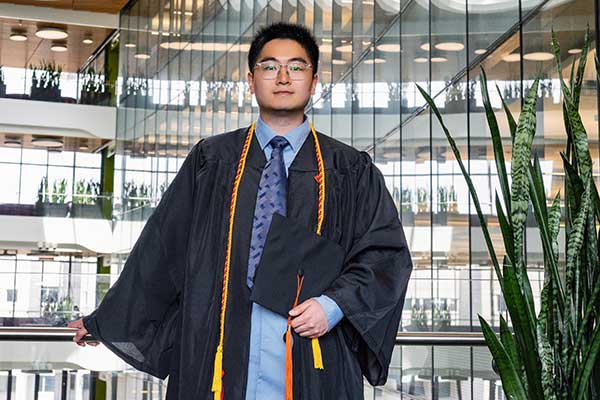
Shengbo Zhao, E’25, electrical and computer engineering, found his passion for hands-on work developing innovative technologies and code while taking classes in his degree program. In both his coursework and co-op opportunities, Zhao has worked on inventive and impactful projects that showcase his advanced skills and allow him to tap into his interests.
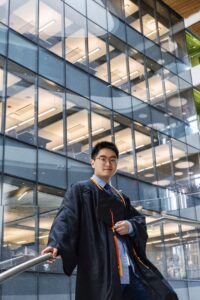
Zhao at graduation.
As an international student from China, Shengbo Zhao said coming to an American university was a bit of an adjustment. However, through joining the Chinese Student Association (CSA), the transition was made easier. Zhao chose Northeastern because of its incredible co-op program that allows students to gain real-world work experience before graduating. He said graduating with prior work experience was something important to him and helped him stand out in the job market.
Zhao wanted a degree program that would afford him a hands-on approach in the field, while developing innovative technologies and creating code. He chose the electrical and computer engineering program because it offered exactly what he was looking for. After taking a computer science course and the required class “Cornerstone of Engineering 1”, Zhao’s interest in working directly with technology and code was cemented. During his time in undergraduate studies, Zhao completed two amazing co-op experiences while he developed extensive research projects in his coursework that have grown his abilities as an engineer.
Co-op at MAPS Laboratory
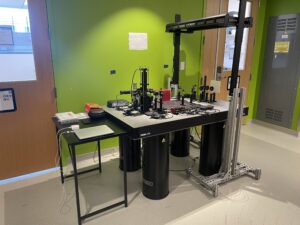
The optics table Zhao was working on in the MAPS Lab.
Zhao completed his first co-op experience at the Microscale Acoustic and Photonic Systems (MAPS) Lab at Northeastern with Assistant Professor Siddhartha Ghosh. The MAPS lab primarily focuses on developing technologies that can be applied in wireless and optical communications, computing and sensing. At the beginning of his co-op, Zhao learned how to be a research assistant by reading research papers and studying optics and photography used in the lab. Zhao was also able to work hands-on while using Ansys Lumerical FDTD, which is a software that allows the user to create simulations. He utilized it to make 3D simulations of the photonic devices they designed in the lab.
The next project Zhao worked on involved developing an optic system. The system included a laser directed at the devices, and the resulting mechanical vibrations generated heat, which was measured using a path-stabilized Michelson interferometer. Zhao contributed by producing detailed optical path designs in CAD and setting up multiple configurations of the system to optimize performance. By the end of his co-op, Zhao had the optics table set up for all the laser passes and completed calculations about the noise ratio needed for the laser.
Co-op at IDEXX
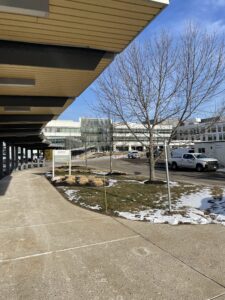
IDEXX building.
For Zhao’s second co-op experience, he worked as an EE systems engineering co-op at IDEXX. IDEXX is a company that manufactures, develops and distributes products and services for the veterinary industry. In this role, Zhao contributed to the development of medical devices for animals, including microchip-based systems. This involved making control and power boards for the actual devices and running simulations of the boards to test the circuits.
Zhao said he had a wonderful experience during his co-op time at IDEXX, especially because his role required a lot of technical hands-on work. This co-op experience offered him insight into the engineering industry and helped him further develop his technical abilities.
Classroom Experience
There are several courses that Zhao completed during his undergraduate studies that he found extremely helpful for his future work. Zhao said the “Cornerstone of Engineering 1” course gave him a strong foundation in coding and software, as well as taught him how to use MATLAB. The materials in the “Circuits and Signals: Biomedical Applications” course, taught by Associate Professor Charles DiMarzio, benefited him immensely and helped him find success during his co-op and capstone projects. In Zhao’s “Introduction to Digital Design and Computer Architecture” course, taught by Teaching Professor Emad Aboelela, he was able to complete a time-consuming project he found riveting. For this project, Zhao programmed a three-stage pipelined MIPS CPU in SystemVerilog.
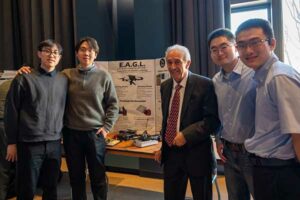
Zhao with his capstone project group.
Zhao says his senior year capstone project, with Professor Bahram Shafai, was deeply fascinating and one of his favorite projects during his time at Northeastern. Zhao and his group developed and built a drone system integrating both hardware and software to achieve autonomous flight and rescue. With the primary functions of the drone intended as a search and rescue tool for real-world emergency situations, they developed it to have localization accuracy features by implementing multi-sensor fusion and ultrasonic arrays for robust victim detection. Zhao and his team had to conduct over 100 field tests to validate the system performance of the drone. Zhao immensely enjoyed developing this project and is proud of the work his group was able to accomplish.
Future Perspectives
Zhao’s time as a research assistant co-op at the MAPS Lab prompted him to consider continuing academia in his career journey. Zhao learned he enjoys working in a research-oriented environment and loves dedicating a lot of time and effort to a single project. Zhao said he appreciates that research gave him the space to be innovative while exploring his passions and interests. Zhao is currently completing his master’s degree in electrical and computer engineering and aims to earn his PhD as well in the same subject. Developing impactful and innovative research projects is where Zhao thrives, and he hopes to keep pursuing them further in his career after graduating.